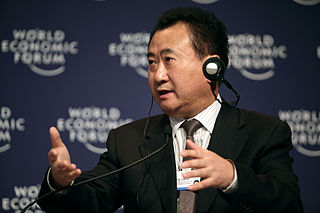A Quote by Bill Gates
The world is very disparate, in terms of the US using the most energy per person, and then the other rich countries - Europe, Japan, New Zealand - using about half of what we do, and then the world average being about a fifth of what we use, with China just now surpassing the world average.
Related Quotes
There's something about us using the word fascism and thinking about, "What is it? What does it mean, and what are the tenets of it?" I've been thinking a lot about folks denying what has happened in history, or just not acknowledging it. I think there's something that's fascist, and something that I think we could probably learn from, in terms of the energy in the world right now.
Anyway, the US, as in most issues, is the best, has the best capability to lead, and really needs to lead. It doesn't [mean] that other countries won't pick different tacks and emphasize different things. In aggregate, they're almost half of the energy R&D. Europe, China, Japan - it's very important that they come along and contribute to these things.
Industrialized countries have disproportionately more cancers than countries with little or no industry (after adjusting for age and population size). One half of all the world's cancers occur in people living in industrialized countries, even though we are only one-fifth of the world's population. Closely tracking industrialization are breast cancer rates, which are highest in North America and northern Europe, intermediate in southern Europe and Latin America, and lowest in Asia and Africa.
We can squabble between the siblings in Europe and not be very productive and then see China and the U.S. win over the European region. Or - and this is my preferred choice - we team up together and are the strong region that we want to be, using each others' strengths and building on our commonalities to become the smartest region in the world.
There aren't many such enthusiasts born. The average person is not especially curious about the world. He is alive, and being somehow obliged to deal with this condition, feels the less effort it requires, the better. Whereas learning about the world is labor, and a great all-consuming one at that. Most people develop quite antithetical talents, in fact - to look without seeing, to listen without hearing, mainly to preserve onself within oneself.
Out of these troubled times, our fifth objective - a New World Order - can emerge. . . Now, we can see a New World Order coming into view. A world in which there is a very real prospect for a New World Order. . .A world where the United Nations, freed from a Cold War stalemate, is poised to fulfill the historic vision of its founders.
I think the retirement crisis globally is a major problem. I think it's especially prevalant in countries such as Japan, where immigration is an issue. I think the US is more shielded from it than most countries in the world. It has a higher birth rate than Japan, immigration is tolerated here unlike probably it is in Japan. I don't think it's as big an issue in the US as it is elsewhere in the world.
China had never had to deal in a world of countries of approximately equal strength, and so to adjust to such a world, is in itself a profound challenge to China, which now has fourteen countries on its borders, some of which are small, but can project their nationality into China, some of which are large, and historically significant, so that any attempt by Chinese to dominate the world, would involve in a disastrous for the peace of the world.



































